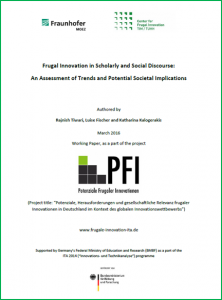 Der Rat für Forschung und Technologieentwicklung und die TU Hamburg (Center for Frugal Innovation) laden zu einem Workshop zum Thema “Potenziale frugaler Innovationen für Österreich” am 17. April 2018 (10-13 Uhr) in Wien ein.
Der Rat für Forschung und Technologieentwicklung und die TU Hamburg (Center for Frugal Innovation) laden zu einem Workshop zum Thema “Potenziale frugaler Innovationen für Österreich” am 17. April 2018 (10-13 Uhr) in Wien ein.
Im Rahmen des Workshops werden die Zwischenergebnisse der laufenden Studie vorgestellt. Des Weiteren wird mit Vertretern aus Wirtschaft, Wissenschaft und Zivilgesellschaft über die (wirtschaftliche) Relevanz frugaler Innovationen in kleinem Kreis diskutiert. Ein besonderer Fokus der Studie liegt auf der nachhaltigen Sicherung der globalen Wettbewerbsfähigkeit österreichischer Unternehmen (insbesondere KMU).
österreichischer Unternehmen (insbesondere KMU).
Im Vordergrund steht dabei auch die Frage, ob innovationspolitischer Handlungsbedarf in Österreich besteht und welche Maßnahmen Unternehmen dabei unterstützen könnten, frugale Innovationen in ihr Produktportfolio aufzunehmen und erfolgreich zu kommerzialisieren.Der Workshop findet in Kooperation mit der corporAID Plattform statt.
Veranstaltungsort: Büro des Rats für Forschung und Technologieentwicklung, Pestalozzigasse 4/D1
Bei Interesse melden Sie sich bitte per Email (g.reitschuler@rat-fte.at) bis zum 10. April 2018 an. Die Teilnehmeranzahl ist begrenzt.
Weitere Details entnehmen Sie bitte diesem PDF-Dokument.
Kooperationspartner:


